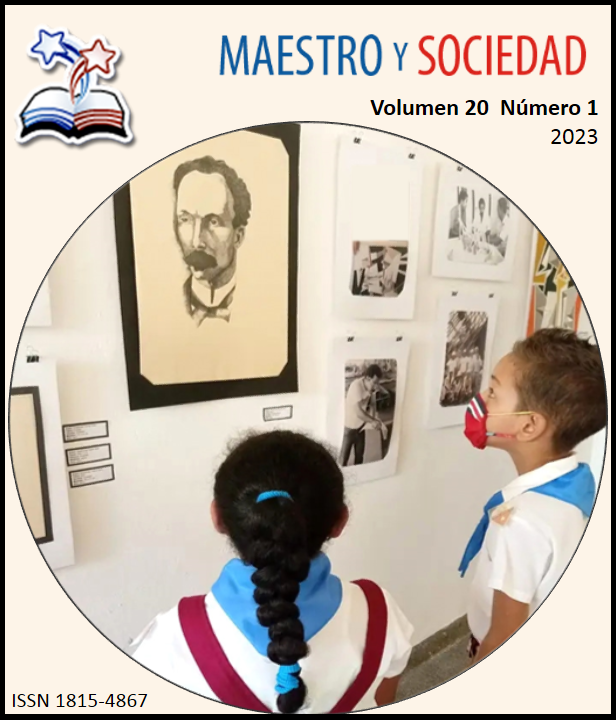Characterization of the pedagogic talkative style for the student motivation in adolescents
Characterization of the pedagogic talkative style for the student motivation in adolescents
Keywords:
adolescence, communication, motivation, teaching learning, didacticsAbstract
Introduction: the objective of the investigation is to characterize the pedagogic talkative style for the student motivation in adolescents.
Materials and methods: was carried out a traverse descriptive study, in the period understood among October 2020 to October 2021, with adolescent students of the educational institute "Mariano Clemente Grassland" of Santa Clara's town, Cuba. Systemic, historical-logical and analytic-synthetic theoretical methods are used; as well as empiric: it interviews students and they interviews the students.
Results: it was verified difficulties in the face of the understanding of the pedagogic communication and they refer to feel without motivation from the process of teaching learning.
Discussion: Education for communication may be the best orientation at a preventive level to promote solutions to conflict situations in a constructive manner between the parties involved in the educational and teaching process.
Conclusions: features of a teaching in the memory are evidenced like they are the non-identification of the essential thing of the content, difficulties before the communication pedagogic educational and little motivation in the contents before the process of teaching learning with the students.
References
Alonso, J. & Montero, I. (2012). Orientación motivacional y estrategias motivadoras en el aprendizaje escolar. In J. Coll & A. Palacios (Eds.). Desarrollo Psicológico y Educación: Psicología de la educación. Ed. Alianza.
Cervera, I. (2014). Material Educativo. http://www.iideac.edu.mx
Díaz, C., Llerena, F. M., Núñez, M. C., Menéndez, G. y González, L. (2012). La superación de los tutores como premisa en la formación de profesionales. http://medisur.sld.cu/index.php/medisur/article/viewFile/2194/7252
García, H. (2012). El consentimiento informado; una acción imprescindible en la investigación médica. Rev Cubana Estomatol, 46(1). http://www.bvs.sld.cu/revistas/est/vol46_1_09/est07109.htm
García, I. (2013). Preparación de los profesores guías en formación de valores y orientación profesional. [Tesis de Maestría. Universidad “Camilo Cienfuegos”].
Gilbert Martínez, C. (2014). Adolescencia y salud. Una mirada contemporánea. Dirección Técnica de Servicios de Salud.
Hernández, R. M., Rojas, K. I. & Rodríguez, Y. (2016). Bosquejo histórico del concepto de motivación profesional. Su abordaje en el contexto cubano. Evento Provincial Pedagogía.
Hérnández, R., Férnandez, C., & Baptista, P. (2010). Metodología de la Investigación (5ta ed.). México D.F: Mc Graw-Hill Editorial.
Linares, M. & Santovenia, J. (2012). Buenas prácticas. Comunicar e informar. Editorial Academia.
Linares, M. P. (2012). Buenas Prácticas. Comunicar e Informar. (s.e.).
Mesa Simpson, C. (2015). Diplomado Prácticas Docentes. Facultad de Ciencias Médicas “Dr. Juan Guiteras Gener” de Matanzas.
Molerio, L. E. y Torres, J. A. (2013). Metodología para el perfeccionamiento de los tutores de formación de los estudiantes de pregrado. Rev EDUMECENTRO, 5(2). http://scielo.sld.cu/scielo.php?script=sci_arttext&pid=S207728742013000200011&lng=e
Rico Montero, P. (2013). Proceso de enseñanza aprendizaje desarrollador en la escuela primaria. Editorial Pueblo y Educación.
Ruiz, H., Milán, M. R., & Fraga, E. (2013). La motivación profesional de los estudiantes universitarios y su influencia en la dedicación al estudio: Papel del profesor. La Habana.
Downloads
Published
How to Cite
Issue
Section
License
Copyright (c) 2023 Jesús Cuéllar Álvarez, Melva García Martínez

This work is licensed under a Creative Commons Attribution-NonCommercial-NoDerivatives 4.0 International License.
This journal provides immediate open access to its content, based on the principle that offering the public free access to research helps a greater global exchange of knowledge. Each author is responsible for the content of each of their articles.



























 Universidad de Oriente
Universidad de Oriente 